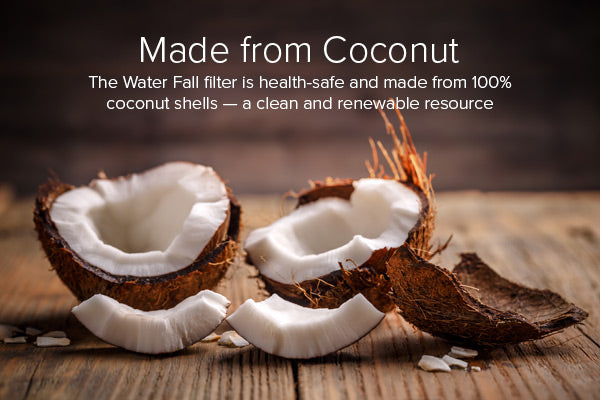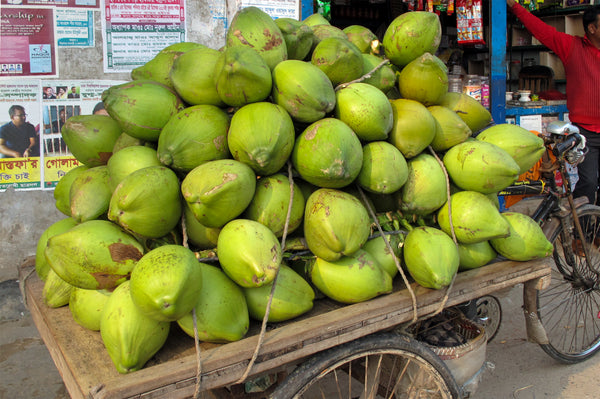
All of our water filtration products here at KOR, including KOR Plus, our new antioxidant and alkaline water bottle and filter use coconut carbon as the main media for making great tasting water. So why use coconut carbon vs. coal or wooden carbon as found in other filtered water products?
Why use coconut shells?
Activated carbon is the filtering agent that eliminates contaminants from water. Carbon pulls unwanted particles, first, to its surface and then deep within its pores, leaving only the purest water possible.
Coconut shells are a renewable resource made of high-grade carbon and are ideal for filtration due to their high percentage of micro-pores on their surface, nearly 50 percent more than coal, making it the most promising option for removing a wide variety of particles and pollutants.
One of the guiding principles for all KOR products is the commitment to sustainability. So, when it came time to create our filtration products, we went with natural sustainable coconut shells.

Benefits of Coconut Carbon Filters
The key benefits of using coconut shell carbon for water filtration include:
- Renewable source of carbon
- Manufacturing is easy on the environment
- Highly porous and tightly structured
The coconut shell filtration systems featured in KOR products have been custom developed to remove chlorine, chloramines (chlorine and ammonia) and objectionable tastes and odors found in tap water. It also reduces hydrogen sulfide and other organic contaminants. Because of coconut carbon’s wide surface area and its porosity, this form of filtration can remove chemicals that have proven difficult to expel using other forms of carbon.
Additionally, our coconut shell filters have independently undergone the NSF 42 test. This test establishes the minimum requirements of filtration systems to reduce aesthetic and non-health related contaminants like chlorine, taste, and odor from drinking water. The NSF 42 test analyzes the carbon filter for material safety, structural integrity and aesthetic, and claims about the reduction of non-health related contaminants.
Coconut shells are a purer form of carbon compared to coal and wood filters. Other forms of activated carbon can add to an off-putting taste from inorganic ash, whereas coconut carbon is more tightly structured and won’t leach.
As previously mentioned, the fact that coconut shells are easy on the environment is hugely important to KOR. Coconuts will continue to grow without needing to cut down the tree itself (unlike when you use wood-based filters) and they’re harvested three to four times per year. Coconut shells can be easily preserved and manufacturing them as filters produces less carbon dust than their coal and wooden counterparts.

Upon learning the ins and outs of coconut shell filters, it makes sense to seize the opportunity to use these renewable resources. Checkout our entire line of filtration products, from portable to at home.


Wow! Thank you for such an innovative form of water filteration. What can be good than filtering your water from coconut shells. I was always worried about the unnatural substances clearing up my water and now I can have what I want. Thank you once again.
https://www.wereviews.com/best-portable-water-filter-purifier-removing-chemicals-viruses-review/
I own a white Kor Water Fall Filter and am very satisfied with it. I have one question a suggestion and a request.
How do I know when to change the filter unit out? I have no idea how much water I have put through my filter. I suppose it also depends on how contaminated our city water is. We are on the Detroit water system, but our water is drawn from Lake Huron. It does taste better without the added chlorinates. If I poured some diet Coke through the filter and it failed to remove the Carmel coloring, would that be an indication the filter is exhausted?
The box my white filter came in also showed the same filter in a black version. My wife had a fit, because I bought a white filter unit and all of our kitchen appliances are black and stainless steel. She thinks the white conflicts with her other appliances. Though she does seem to like the water it makes. I actually did shop around the Internet looking for the black version, but could not find any for sale. Is there any way I can buy a black stand to please my wife?
Hi Danielle Gaynor,
We do not currently have a filter recycling program but are working on it for the future. Keep in touch. Thank you!
Nora
KOR Customer Care
Hi,
are the casings for the filters recyclable? Do you take them back for recycling?
Many thanks,
Danielle
Thanks for the comment, Marian. Water Fall’s filter has been custom developed by KOR to remove chlorine, chloramine (chlorine+ammonia) and objectionable tastes and odors found in tap water. It will also reduce hydrogen sulfide and other specific organic contaminants. Our internal tests have demonstrated a rating to 80 gallons meeting NSF 42 for chlorine and chloramine.
Nava’s filter is primarily designed to make tap water taste and smell great. It does this by reducing the amount of chlorine in the water. It has been tested by an independent lab to meet or exceed the NSF Standard 42, Class II for chlorine removal . The activated carbon in Nava’s filter also traps volatile organic compounds (VOCs) such as benzine, but the filter has not been tested or certified for this capability. It is also important to note that Nava is designed for use with potable water only. It does not remove Giardia or other harmful microbes.